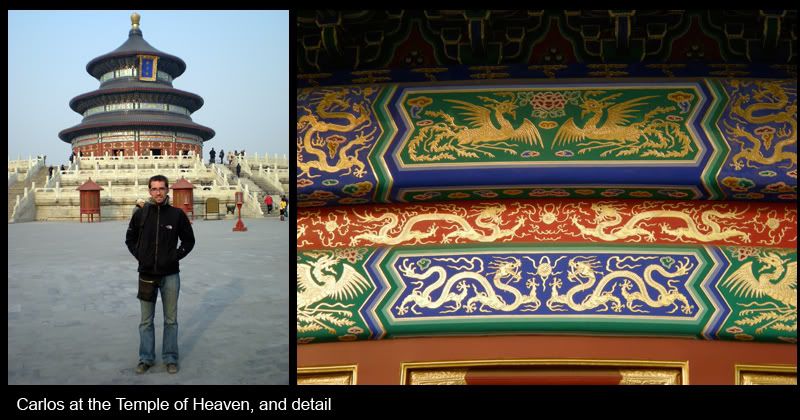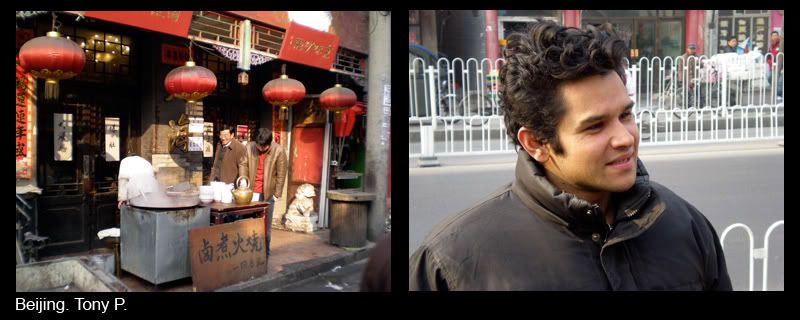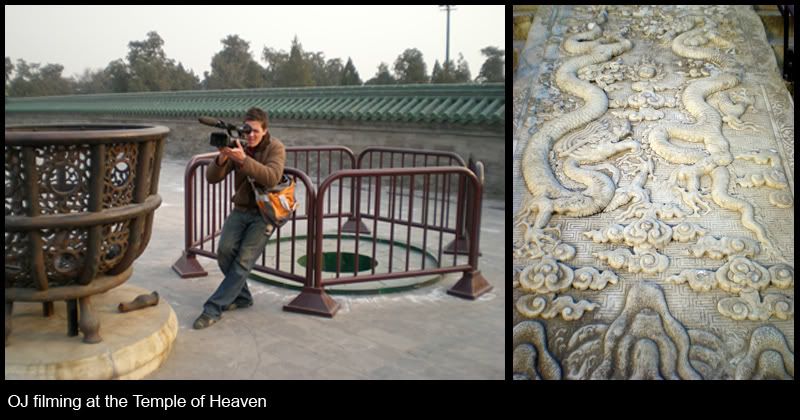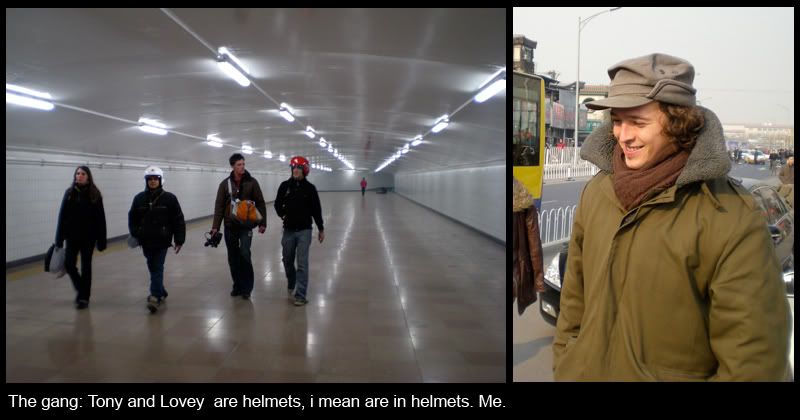Beijing
December 2nd-5th, 2007
By Dan Murdoch
WHAT a stupid place to put a wall.
Skirting the steep, pyramid hills north of Beijing, the crumbling, turreted Great Wall of China rises and dips across the horizon as our noisy, angry convoy, stop starts down the motorway.
What a stupid place to put a wall.
If I’d bothered leading an army up those vertiginous slopes I wouldn’t get to the top and go: “Oh bollocks, someone’s only gone and built a wall up here. Right that’s it. Turn back lads, we’re not invading. Lets go home.”
Surely those hills are enough of a natural barrier and don’t warrant being topped by a shaky looking heap of ancient bricks.
And it’s not a continuous wall. It’s a bunch of small strips, a half formed defence, as if the labourers had stopped work during a pay dispute.
What kind of barrier is that?
Don’t worry we’ve sort of walled off China.
Rubbish.
It’s an ill-conceived plan anyway: the ‘barbarians’ that came from the north were mostly the mounted nomadic horseman types. You don’t take horses up mountains, but you do take them on long road trips around ridiculously porous defences.
Really the wall was little more than the emperor’s cock extension. A way for him to show the people he was in charge and define his territory, for tax purposes as much as anything. I read that the Great Wall never stopped a single invasion.
Quite a few people were heading out on day trips to get a closer look, but I really don’t see the attraction.
“What you don’t have walls in your country?” I asked. Flippant wanker.
“I’ll settle for Hadrian’s.”
But the Great Wall did stop one invasion.
Dante didn’t make it. The little Trabbi gave up within sight of the thing, maybe scared by this epic wonder. Three of us hitched a lift from a passing people carrier. Ziggy towed Dante into Beijing.
Just two cars left, one being towed. An ignominious arrival in the Chinese capital.

The drive from Xilinhaote to Beijing was mostly downhill, and as we descended the steppe, the long ridge stretching across northern Eurasia, the temperature rose rapidly from a bone chilling –15c to a pleasant 5c.
For the past six weeks we have been fighting running battles with condensation in the cars, which freezes almost as soon as it appears, so you constantly have to use an ice scraper on the inside of the windows.
But at one point on our trip south OJ turned to me: “Watch this.”
He breathed a deep, heavy lungful of warm air onto the windscreen, and instead of sticking and icing over, it melted the film of ice from the glass.
We cheered that one for a long time.
We found a hostel in a grubby area of town alive with a vibrant assault on the senses. This was the China we had come to see. Narrow streets, unwelcoming for cars, filled with a giddying stream of hawkers, floggers, taxis and shoppers.
Men cooking stir-fry in giant woks line the street, women deep fat frying odd shaped spring rolls. Buddhist candles, fighter pilot’s helmets, digital cameras, wood carved Buddhas, friendship bracelets, straw hats and memory sticks competing for attention.
The forward party agreed to meet the towers in Tiananmen Square, under the big Mao picture. We went to McDonalds, then Pizza Hut. Incredibly expensive Western food, sometimes you just have to do it.

At the bar of our Guesthouse, the sensationally friendly Leo Hostel, I got chatting to a Dutch author and journalist who has been covering the region for 25 years.
My Dutch friend was anxious. He had just published a book about Tibet, the Himalayan country that has been occupied by the Chinese sine the 50s. In it he revealed interviews with a lot of unhappy Tibetans and portrayed the Chinese involvement as an occupation.
Although the book wasn’t to be printed in Chinese, he was worried that someone working at the Dutch Embassy would read it and report him to the authorities. He had a flight out of the country in three days, the book came out five days before, and he was worriedly sitting out the time.
“If they don’t like what I wrote, maybe they wont let me leave.”
I’ll leave his name out of this.
I asked him to describe the Beijing he first saw in 1982.
“The whole city was mostly Hutongs.”
Hutong: area of low-rise buildings with narrow lanes and alleys.
“Which is great, lots of character. But every 50m you have a communal shit house. So it stank. And people used communal kitchens or cooked on the streets, so everywhere there is this smell of cooking and shit.
“There weren’t many proper roads, and the streets were full of bicycles, there were almost no cars- just a few trucks. Everyone was riding bicycles.
“Tiananmen Square was full of young lovers. They would set their bikes up with blankets and do what young lovers do. Not like now: it is all police now.
“Everyone looked the same, because everyone dressed the same. They had the Mao tunic, and the short trimmed hair. I couldn’t tell the boys from the girls. I remember coming back in 1988, when things had moved on a bit, and thinking ‘wow, where did all these tits come from?’”
As the night wore on he got more drunk, and our conversation slowly morphed into him telling a series of rambling stories which I lost interest in.

The next day I wondered around the city and tried to compare it to the Beijing Old Dutchy had portrayed.
There’s certainly cars now- driving around the city is as much of a nightmare as any other- it’s a bustling, heaving metropolis- but there are plenty of proper roads, controlled by solar powered traffic lights.
We are staying in a hutong, but much of the city shows signs of recent redevelopment: sky scrapers, sprawling malls and shopping districts, neat, glassy office blocks and flashing neon. They love their neon, obsessively ringing public buildings in bright lights- an epileptic nightmare of these flashing colours and shapes.
And the people certainly aren’t sexless. This is a fashion conscious society, particularly the younger generation: teenagers in skatery, bright stockings and denim mini skirts with furry boots. Guys in hip-hop leather jackets with baggy pants and baseball caps.
“Shopping is not a sin” one advert gleefully shouts out in bright English. So much for the communist mantras. Our cultural leaders- David, Jodie, Kate- pout down on us from billboards rivalling even Mao’s.

Mao. His portrait hangs, not smiling, but still benevolent, at one end of Tiananmen Square, the square made famous by the violent quashing of a student demonstration in 1989: the iconic photo of the student standing in front of a tank.
On emerging from an underpass I was greeted by a line of five cops, four grunts standing stock-still and a senior, eyeing the passing crowd.
A little over the top I thought, but not too sinister.
I wondered around it and felt the little Dutchman had been a little harsh, it was busy, filled with tourists and guides, hawkers selling Chinese kites and Mao watches. The centre of the Square has the obligatory monument, though this one has no statue on top, and at one end is some impressive statues depicting idealised China men rising up in the revolution of the 50s.
A pleasant nationalistic scene, just like Trafalgar Square.
Mao must have liked his parades. The square is vast, and at one end are huge viewing platforms. The forces parading past would make an epic sight.
But as the square opened up before me, and I could see the subtle scale of the military presence, it dawned on me: the place was under lockdown.
Guards in sharp cut uniforms stood at attention every 50m, remaining so still they faded into the background, almost invisible, but omni present. They are everywhere, but you would only notice if you looked.
It was the same at the zebra crossings, eagle-eyed officials staring warily at visitors as they file through a narrow gap in the perimeter fence.
CCTV cameras ring most of the lampposts, there were scores of them, and must have been hundreds of military and police.
I even felt wary walking around with a notebook out, staring at uniforms and cameras and scribbling.
I can’t imagine there will be too many protests here.
IF YOU READ AND ENJOYED THIS BLOG, WHY NOT SHOW YOUR APPRECIATION BY MAKING A SMALL DONATION?
www.firstgiving.com/trabanttrek
100% of your donation goes to Cambodian children’s charities.

Ends
mrdanmurdoch@gmail.com
For more of Dan’s blogs visit: danmurdoch.blogspot.com or www.trabanttrek.org


No comments:
Post a Comment